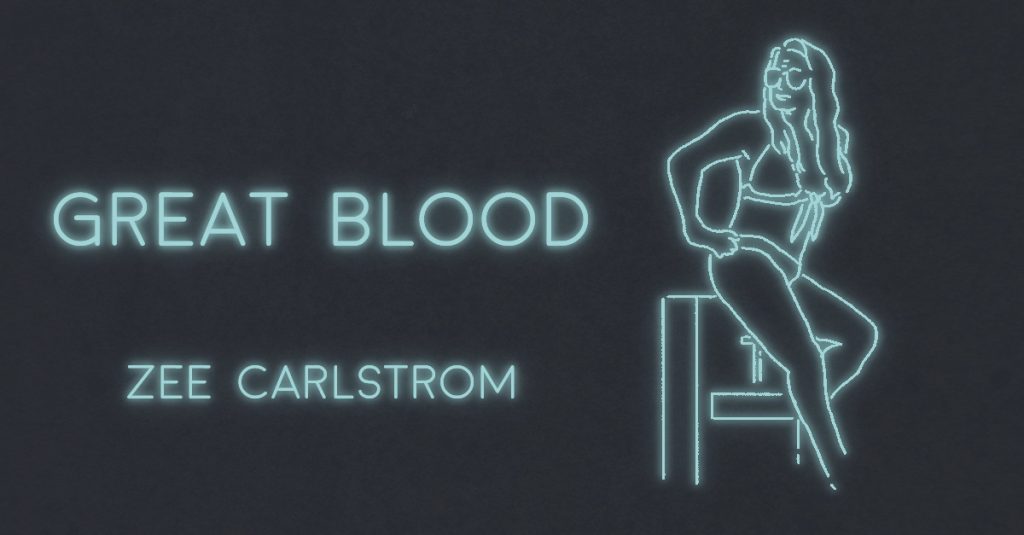Every day, during his half-hour lunch break, Horace Median Dahl strolls along the ornamental concrete pathway that cuts through the center of Grace Hill Cemetery. During this restive walk, he eats his usual brown-bag lunch: a snack-sized sack of Doritos and a chicken and cheddar sandwich with BBQ sauce, the way his mama always makes it.
Today, however, Horace strays from the ornamental concrete path and tosses his mama’s lunch into the garbage. Unencumbered by tradition, he strides down a weedy gravel walkway that takes him into a dark corner of the cemetery, devouring a tilapia salad sandwich and a can of ranch-flavored Pringles he purchased from a deli.
He does this, makes these changes, because other things in his life need to change—bigger things than chips or lunchtime walking routes—and Horace believes he can start small and work his way large, hoping decisions are like atomic particles, minuscule molecules that, when combined, create universal shifts. The kinds of shifts that move a thirty-seven-year-old warehouse manager out of his mama’s spare bedroom and into the warm embraces of greater hopes and truer lovers, lovers of a sexual variety, with fascinating private organs and lips that taste, he imagines, nothing like BBQ sauce.
The gravel path crunches beneath his Asics, a comforting sound as he meanders past the crumbling graves, far older and poorer than the grand monuments lining the central pathway. Beneath the yellowing oaks and orangish maples, he pops his Pringles’ top and inhales the new-can smell. Intoxicating and vaguely alluring.
High on ranch-flavored dust and the potentiality of his future, Horace strolls toward a statue—a fat angel with a wreath of dead flowers on its head. Chuckling, he stops and observes the angel, which seems to stare into the place where Horace keeps his secrets. Then, he hears a lustful voice behind him.
“Hey there, big fella.”
Startled, Horace wheels toward the voice. There, on the other side of the path, he finds a middle-aged woman wearing a red-white-and-blue bikini. She’s seated on a gravestone with her arms resting on her knees, her head cocked, and her lips set with a curious smile.
“I assume you’re here cuz of my Craigslist advertisement,” the woman continues. “And if not, then I’m wonderin’ if you’d like to be my baby’s daddy.”
Horace nearly drops his chips but holds fast to the can. He studies the woman. She is not particularly attractive, but still out of the league he has come to accept as his own. Flesh bunches around the edges of her patriotic bikini, and her nose is the size and shape of a parrot’s. And yet, regardless of these and other shortcomings, Horace is drawn to the woman’s countless folds and ripples, and the question of fatherhood echoes in the meager vaults of his masculine mind.
The woman sighs. “Judgin’ by your obvious surprise, I’m gonna take it you haven’t read my Craigslist post. If that’s the deal, please lemme explain—”
She does explain, and Horace listens, nodding and smiling while the woman makes jokes about her father’s death, his kooky last request, his alarming insistence that she preserve their ancient bloodline, their ancestral greatness, the Knights Templar and the Freemasons, Benjamin Franklin and Joan of Arc. She says her first name is Guinevere, her last name is Magdalene, and her father specifically requested she breed a heroic descendant on his grave, taking as her mate an average stranger with poor eyesight and questionable prospects.
“I know it all sounds a little nutty,” Guinevere continues. “But your glasses are pretty thick, and your shirt’s too large, so I’m assumin’ you meet my daddy’s requirements.”
Horace stress-chews a mouthful of Pringles and swallows with difficulty. “I do.”
“Super.” Guinevere smiles—warm yellow teeth—and unties the strings binding her bikini bottom. With a flick of her wrist, she exposes herself.
Mortified, Horace averts his gaze, turning back to the fat angel with the dead flowers on its head.
“Oh my God,” he mutters. “Oh my God, oh my God, oh my God.”
“Relax.” The woman lays back on the grave and stares at the sky. “You got this.”
Horace shifts on his feet. He looks up and down the gravel path. Surely, there are hidden cameras in the bushes. Surely, this is not happening to him in real life. But then, it must be. He’s never had a dream before, not even during the day, and this is all too imperfect for fantasy. Too impossible.
“What are you waitin’ for?” murmurs Guinevere. “I’m offerin’ you everything.”
“I’m coming,” Horace whispers, stumbling forward, unzipping his khakis with his non-Pringles hand and wondering what mama would think if she knew he threw away her sandwich, her chips, her kindness.
“There ya go,” Guinevere coos as Horace climbs onto her body. “It’s only weird if we think about it.”
Horace clears his throat and avoids his thoughts. He drops the Pringles can into the grass. He does his best. Long seconds pass, and he tries to breathe through his nose, sparing Guinevere his fish-tinged breath. He moves like the men he’s seen in the videos. He moves like a man worthy of responsibility. He moves like a hero with a future, a house of his own, a life worth living. He grunts and struggles, and Guinevere sniffs and coughs.
“This don’t mean nothin’,” she mutters. “This ain’t for you or me.”
“I know,” Horace gasps, willing his body to cooperate, envisioning his eventual child. A genius, perhaps. A titan of industry. An eminent world leader who will forget his father entirely the way Horace has long tried to forget his own.
“Oh God,” Horace hisses. “Oh God, help us all.”
“Why you cryin’?” Guinevere asks, tenderly, but it’s too late. Lunch break is over. The Pringles are finished. Horace can already feel himself deflating, the great urge dying, the chance passing like time.

